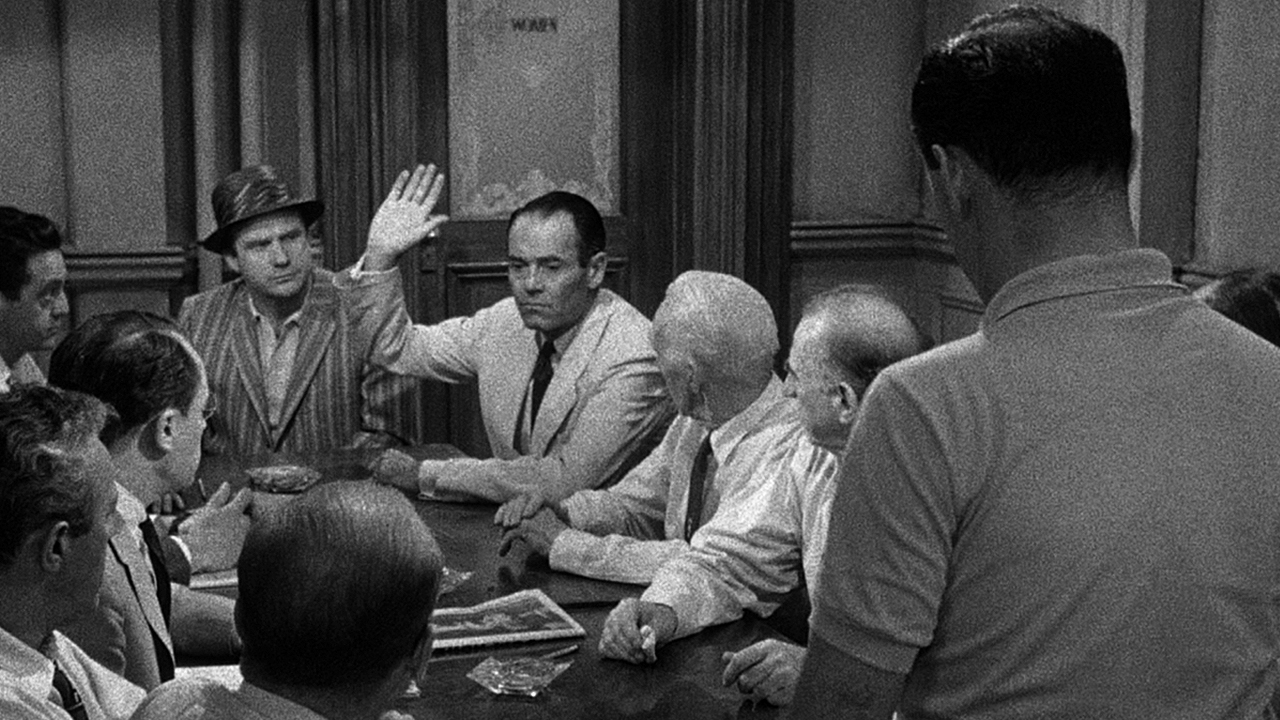
Lines between media are always in flux. Right now, a lot of “prestige television” borrows elements usually associated with film, to the point where you can’t read a description of Mad Men or Breaking Bad with it being lauded for its “cinematic qualities.” There was a time when the roles were reversed; in the 1950s, a subset of American films specializing in a gritty, realistic New York vibe looked to television for inspiration. 12 Angry Men, the first feature directed by Sidney Lumet, made after nearly a decade of honing his craft on TV, is an exemplary piece of work. It’s an airtight, precisely calibrated movie about the fallibility of man and how much tooth-gnashing goes into making the system work even a little bit.
The movie’s titular angry men are played by a murderer’s row of character actors, which immediately gives each juror a textural depth through voices, ticks, and mannerisms alone. Among them are Jack Warden as the baseball-obsessed seventh juror, and Lee J. Cobb as the bigoted, boorish third juror. But the movie’s driving force is Henry Fonda’s eighth juror, the only person at the movie’s onset who isn’t convinced that the kid they’re trying is 100% guilty. It’s a compelling performance; Fonda mines the same territory as he did in John Ford’s Young Mr. Lincoln, exuding all manner of righteousness and compassion. The character’s mantra might as well be “It’s possible,” inviting everybody else in the room to consider every possibility, only to then break down their arguments to their smallest component to see if it still stands.
The film is interesting not only because it presents the judicial process as a puzzle to be solved, but also because it comments on its very effectiveness. 12 Angry Men posits that the system, however well-meaning it might be, is only as good as the people you feed into it. If everyone were as emphatic and thorough as Henry Fonda, the court system would be an idyll of fairness. But the system as is has to work with the bigoted, the ignorant, and the just plain uninterested. That it can work at all, even just this once, is kind of a minor miracle. The movie shows time and time again that the system can be derailed at any turn by emotions and biases, and in extreme cases can cost an innocent person their lives.
Beyond its compelling performances and economical build, the film has a dynamic feel to it. Much of it is the visceral performances, but Lumet’s smart, crisp direction makes the most of the claustrophobic set. The Criterion transfer of the film is gorgeous, with just enough textured grit to help tie it back to its roots in the Golden Age of TV (the no-bullshit Paddy Chayefsky-esque vibe doesn’t hurt, either). It’s hard to imagine a world without the glut of law procedural that occupy the airwaves. All of them are indebted to 12 Angry Men, and few, if any, can best it.
—
12 Angry Men is available on DVD and Blu-Ray from Amazon.
Directed by Sidney Lumet; written by Reginald Rose; starring Henry Fonda, Lee J. Cobb, E. G. Marshall, Martin Balsam, Jack Warden, John Fielder, Jack Klugman, Edward Binns, Joseph Sweeney, Ed Begley, George Voskovec, and Robert Webber; 96 minutes.



 Derek
Derek
 Isabelle
Isabelle